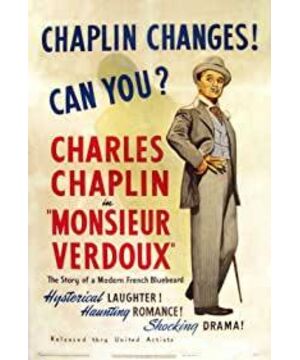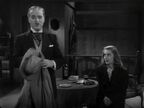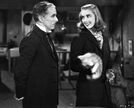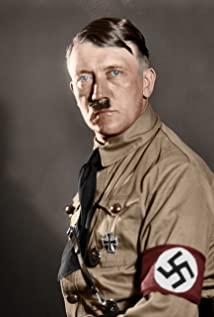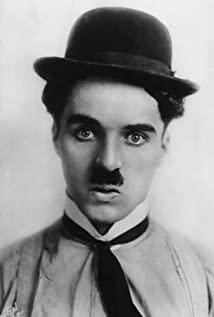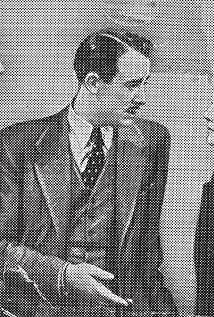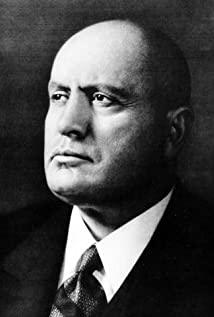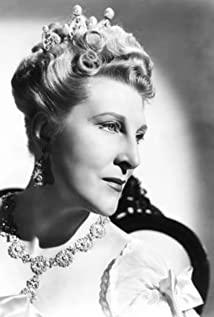__________________________________________________________________________
Before starting this article, please allow me to say "Qianli Bazin (Andre Bazin, 1918-1958) )!" Li Bucai originally wanted to write an article on Chaplin's (Charles Chaplin, 1889-1977) comedy contributions, and waited after reading his later masterpieces "Monsieur Verdoux" (1947), "The Stage Career" "(Limelight, 1952), ready to hand pen. Good or bad, I have a copy of Bazin's "Bazin on Chaplin" at hand, read it while it's hot after watching the film. Well, "Mr. Verdu is the little tramp who entered the money society" was written; "The stage career is the end of the little tramp" was written. Bazin also sees the little tramp as a mythical figure that transcends a single text. In the process of developing the character, the little tramp gradually becomes realistic, and the plot also tends to satirize reality. Therefore, the mime actor who speaks must step down and bow. His grandmother's, what I wanted to talk about, what I didn't expect, what I thought too superficially, all the goddamn things were told. After rummaging through the collection, Bazin could not interpret it, so he raised his hand and surrendered. This article is used as a supplementary information, and I hope it will not damage the style of the film critic.
Let's start with Chaplin's life. Chaplin came from an acting family, his parents were comedians, but they separated when he was young. His father (Charles Chaplin, Sr.) was an alcoholic and raised a woman outside, while his mother (Hannah Chaplin) lost the stage due to his voice pouring out and raised the Chaplin brothers (Sydney Chaplin) alone. Chaplin's childhood was inseparable from the word poverty. Because of poverty, the mother went to a workhouse (the prison for the poor), and the two children went to a labor camp for poor children, and the family was scattered. The series of blows sent his mother in and out of the mental hospital several times. Born in a humble background, Chaplin has been rolling around in society since he was a child: newsboys, printers, servants, toy hawkers, etc., can be said to see all kinds of life. After the Chaplin brothers all entered the troupe, life gradually improved. In 1913, Chaplin went to the United States for the second time with the Karno Troupe. During the tour, he was discovered by Keystone Studio and entered the film industry. In a short period of time, he became a nationally known comedy star.
In the early days of film development, because there was no concept of "editing (Note: modern film techniques, most of the critics take American director Griffith [DW Griffith, 1875-1948] as the master)", and the filming time was limited (film rolls). length), and without the development of recording technology, the one-act comedy that won with physical action became the box office guarantee of early films. Chaplin is taking advantage of this trend to become popular. The first sound film in 1927 ("The Jazz Singer") caused a sensation, and various studios entered the sound film in a big way, causing the demise of the silent film. All previous silent film stars have gone into history. In the sound era, only Chaplin has successfully launched silent films and successfully transformed them.
Before talking about Chaplin's comedic achievements, a few definitions of comedy:
Comedy usually always leads to a happy ending, and the audience's general response to a happy ending is "it should be," which sounds like a moral judgment. This is true, but this is not strictly a moral judgment, but a judgment of social values. The opposite is not evil, but absurd.
In satirical comedy, we discover that art has a lower limit of real life, which is a cruel and barbaric world. Comedy is about how the world inflicts pain on a lonely victim... Satirical comedy makes us see Until the scapegoat is brought to the altar, it takes us into a nightmare and teaches us to face symbols that epitomize fear and hatred on earth. As soon as we step out of the realm of art, such symbols suddenly become social reality.
- "The Anatomy of Criticism," Northrop Frye's
laughter should be such a thing, it should be a social gesture. Laughter, through the fear it induces, sanctions eccentric behavior, keeps those secondary activities that are in danger of isolation or sleep very awake, keeps in touch with each other, and at the same time restores everything that might be engraved on the surface of the social body. flexible.
- "Laughter," Henri Bergson
Judging from these Aliza quotes above (if your brain cells are still functioning), comedy has at least a few characteristics:
1. The object being mocked (the character ); , customs) are inconsistent with current values.
Second, laughter represents the social consensus to punish abnormal behavior.
3. When the creation of comedy tends to be more realistic, that is to say, it tends to be more satirical, those who are mocked are actually suffering on our behalf - the abnormal may not be a comedy character, but a certain social norm.
Judging from the above conclusion, Chaplin's comedy is from popular (low level of realism) to satirical comedy (high level of realism). His early films, such as "Shoulder Arms" (1918), "Finding a Son and Meeting Immortals", "The Gold Rush" (1925), "The Circus" (1928), etc., The social phenomenon is not satirized, and the humanitarian spirit of the later works has not yet invaded the comedy atmosphere. We are concerned with the travels of the little tramp. Even in "Finding a Son and Encountering Immortal" with humane care, Chaplin did not focus on the class difference between star mothers and homeless fathers and sons. In "City Lights", we saw the innocent suffering of the little tramp for the first time in the rich man who was good when he was drunk, and turned ruthless when he was sober. The poor were abandoned by society.
When "Modern Times" (1936) and "The Great Dictator" (1940) came out, people's nerves began to be touched; satirizing capitalist society, totalitarianism and American conservatism. At this time, everyone's favorite Chaplin began to be questioned. No matter benevolent or malicious, people miss the happiness that the little homeless brought them "no worries" in the past. The subsequent "Monsieur Verdu" was adapted from a real social case: During the Great Depression, a man in France cheated marriages with a middle-aged single woman many times in order to raise his wife and children, and killed the other party to take property. Critics and audiences have been flooded with criticism of the film. On the surface, they didn't want to see the cute little tramp turn into a murderous murderer. In fact, the underlying factor is that after the little tramp entered the capitalist society, he adapted to the rules of the game, and he chose bad methods to survive without any remorse. It ruined a beloved character and struck a tacit consensus among the public that this society is sick.
In my opinion, satirical comedy is a genre that matured after modernization. In the past, satirical comedies were aimed at small social units such as "people", "current events", and "customs". But after entering modern society, the boundaries of all values are disintegrated; everything is directly related to capitalism, or related to its ideology. Humanity has been forced to face the same system throughout history. It is at this height that modern satirical comedy develops: Franz Kafka, Ryunosuke Akutagawa, Albert Camus, Theater of the Absurd, Black humor (American literary genre), They are all developing their literary creations under the proposition of modernization, referring to the absurdity and nothingness of contemporary society. As a nascent art, film cannot be separated from this torrent.
Chaplin's years of activity overlap with major events of the first half of the twentieth century: imperialist expansion before World War I, World War I (1914-1918), the Russian Communist Revolution (1917), the Great Depression (1929) , the rise of fascism (1933), the Second World War (1939-1945), the Cold War (1947-1991), the American McCarthyism (McCarthyism, 1950-1956 [the anti-communist paranoia of the US government]). As far as the little tramp is concerned, this character will be welcome in any context, as long as he maintains "the neutral and rational surname of Zhongli Li". But when Chaplin's creation slid into satirical comedy, exposing the injustice of the social system, people began to compete for the position of the little homeless platform, or simply criticize his creator. "Modern Times" ridiculed the inhuman environment of modern industry, and the masses began to question whether Chaplin was inclined to communism. When "The Great Dictator" was released, the United States was still in isolation, and conservatives criticized Chaplin for encouraging the United States to intervene in international disputes. During the promotional video, Chaplin expressed in his speech that the U.S. military should join the war to aid the Russian army. So far, communism has become a label that he cannot tear off. In 1952, when Chaplin returned to Britain to promote the film, the McCarthyism-riddled United States banned Chaplin from re-entering the country.
Looking at Chaplin's life course and film creation, we can see how he still retains his feelings for weakness after he became famous. As he said, he opposed patriotism and nationalism. He was a cosmopolitan and a humanitarian. Communism is just the left's compliments of him. The little homeless man never stops; he watched his best friend leave, took a street boy into a mansion where his mother was a singer, joined hands with a female dancer, made a rousing speech for the world, and walked with victory. Entering the execution ground, he confided to us at the curtain call that he wanted to die on stage, and that the public below the stage would still love that poor kid from London. After the industrialization of movies, we will no longer see heresies like Chaplin, and in the globalized world after the victory of the Cold War, there will no longer be diverse voices demanding that the little tramp be reborn. Little Tramp belongs to that turbulent age, he comes from a disgraceful age, but he comes from a time when comedy can be great.
____________________________________________________________________________
In my opinion, conflict and pain are basically life. So I unknowingly used this as a basis to gag. How to get a few characters into trouble and then get them out of trouble. That's how I make a comedy, it's simple. However, the humor is different and more subtle. Humor is a tool that allows us to see the abnormal in the seemingly normal, and the unimportant in the seemingly important. In addition, humor keeps us clear-headed, enhances the meaning of our existence, and promotes our sense of harmony. -Chaplin
_____________________________________________________________________________
◎I stress again that the main concept of this article comes from Bazin, and has nothing to do with my literary talent
◎"Mr. Verdue" and "A Career on the Stage" are very important in Bazin's "Bazin on Chaplin" Excellent interpretation, pointing out the development of the relationship between the little tramp, Verdu, and the old clown. If Li Bucai repeats it here, it is not picking up people's teeth and wisdom, but plagiarism. Interested parties are also invited to read on their own.
Bibliography
"Autobiography of Chaplin", Chaplin, China: New World Publishing House
"Bazin on Chaplin", Bazin, China: Shanghai People's Publishing House
, "Anatomy of Criticism", Frye, China: Hundred Flowers Literature and Art Publisher
"Laughter", Bergson, China: Beijing October Literature and Art Publishing House
View more about Monsieur Verdoux reviews


